 理数個別チャンネル
理数個別チャンネル
 理数個別チャンネル
理数個別チャンネル
※下の画像部分をクリックすると、先生の紹介ページにリンクします。
【英語】トム・クルーズの映画で学ぶ動詞の多い文!

単元:
#英語(中学生)#英語(高校生)#英文法#中3英語#不定詞#関係代名詞・関係副詞・複合関係詞#関係代名詞(主格、目的格、所有格、thatの用法、前置詞+関係代名詞)
指導講師:
理数個別チャンネル
問題文全文(内容文):
"All You Need Is Kill"というトム・クルーズの映画のタイトル、動詞が多すぎない!?
この動画を見る
"All You Need Is Kill"というトム・クルーズの映画のタイトル、動詞が多すぎない!?
【受験算数】立体切断演習問題その17「断面部の体積を求める問題7」
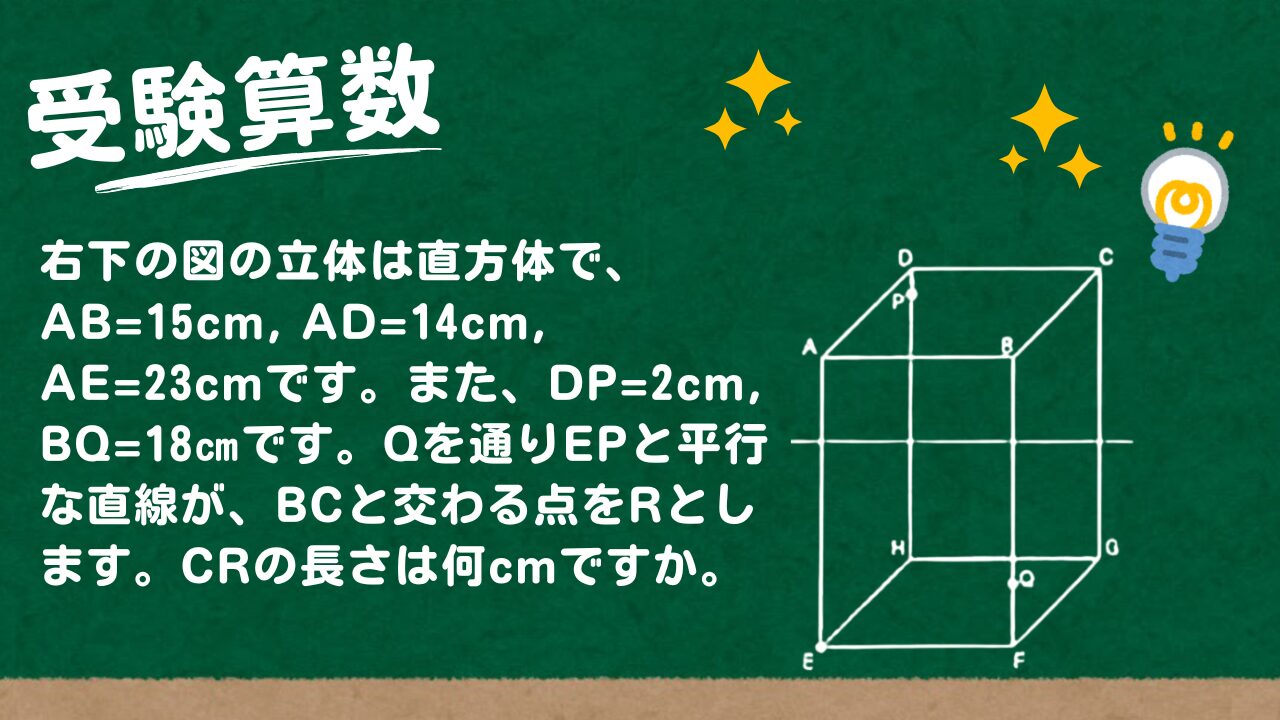
単元:
#算数(中学受験)#立体図形#立体切断
教材:
#SPX#6年算数W-支援#中学受験教材
指導講師:
理数個別チャンネル
問題文全文(内容文):
右下の図の立体は直方体で、AB=15cm, AD=14cm, AE=23cmです。また、DP=2cm, BQ=18㎝です。
(1) Qを通りEPと平行な直線が、BCと交わる点をRとします。CRの長さは何cmですか。
(2) Pを通りEQと平行な直線が、CDと交わる点をSとします。CSの長さは何cmですか。
(3) PSをSの方向へ延長した直線が、GCをCの方向へ延長した直線と交わる点をTとします。CTの長さは何cmですか。
この動画を見る
右下の図の立体は直方体で、AB=15cm, AD=14cm, AE=23cmです。また、DP=2cm, BQ=18㎝です。
(1) Qを通りEPと平行な直線が、BCと交わる点をRとします。CRの長さは何cmですか。
(2) Pを通りEQと平行な直線が、CDと交わる点をSとします。CSの長さは何cmですか。
(3) PSをSの方向へ延長した直線が、GCをCの方向へ延長した直線と交わる点をTとします。CTの長さは何cmですか。
【受験算数】立体切断演習問題その16「断面部の体積を求める問題6」
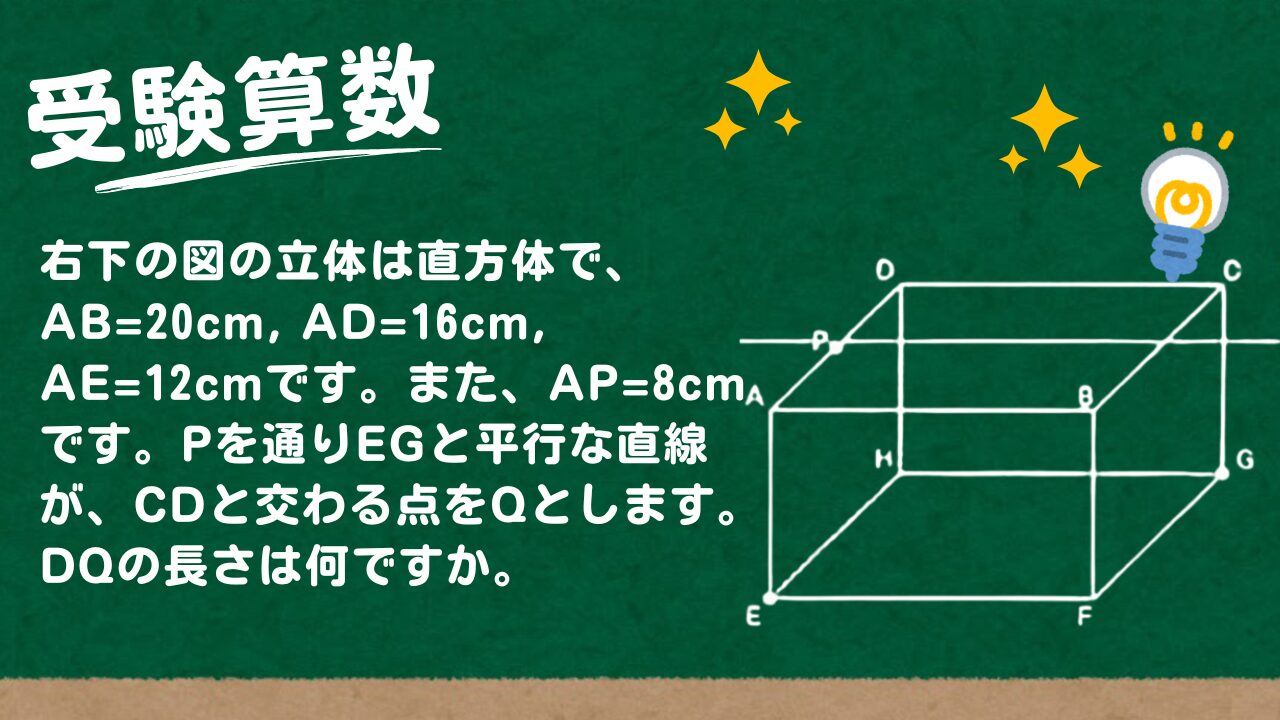
単元:
#算数(中学受験)#立体図形#立体切断
教材:
#SPX#6年算数W-支援#中学受験教材
指導講師:
理数個別チャンネル
問題文全文(内容文):
立体切断演習問題その16
61-16(体積を求める④ー1)
この動画を見る
立体切断演習問題その16
61-16(体積を求める④ー1)
【受験算数】数の性質:繫分数 分数の中に分数があるものの考え方

【受験算数】繫分数分数の中に分数があるものの考え方

【英語】英文解釈:ドスタム

単元:
#英語(高校生)#英文解釈
指導講師:
理数個別チャンネル
問題文全文(内容文):
Dostum didn't search his prisoners.をどう訳しますか?
・・・ドスタムは彼の囚人を探さなかった??
この動画を見る
Dostum didn't search his prisoners.をどう訳しますか?
・・・ドスタムは彼の囚人を探さなかった??
【受験算数】立体切断演習問題その15「断面部の体積を求める問題5」
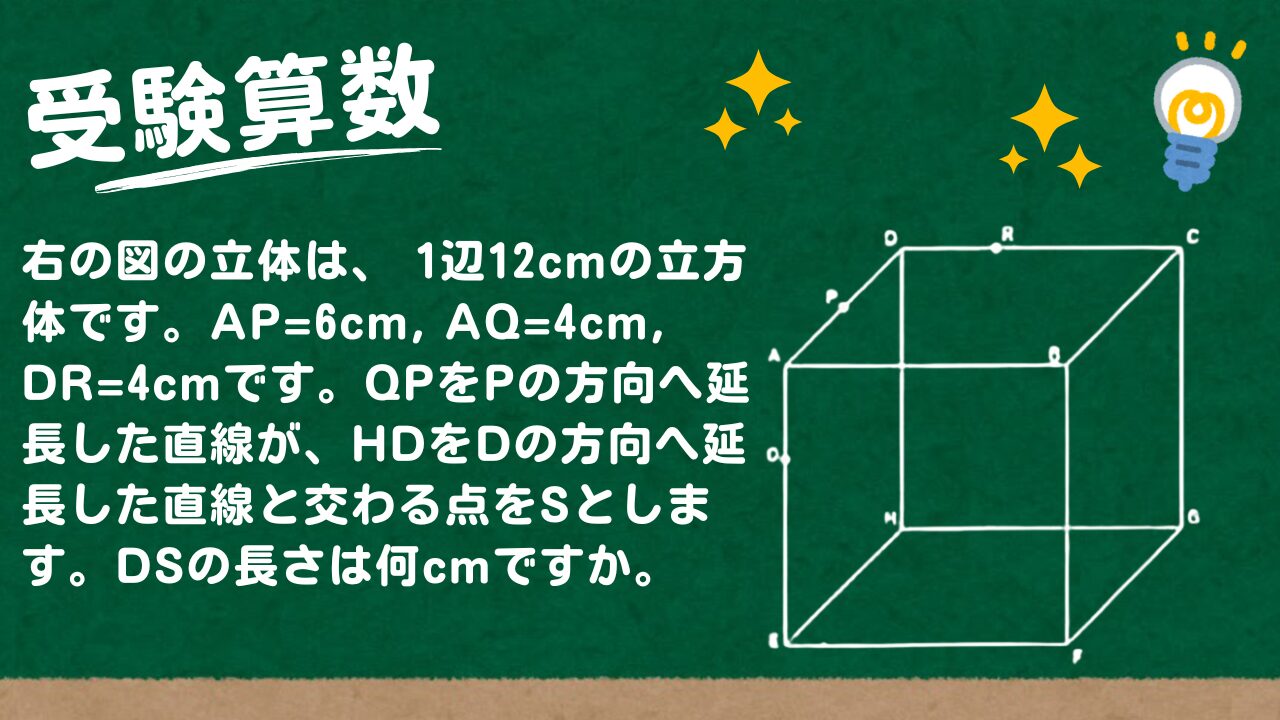
単元:
#算数(中学受験)#立体図形#立体切断
教材:
#SPX#6年算数W-支援#中学受験教材
指導講師:
理数個別チャンネル
問題文全文(内容文):
右の図の立体は、 1辺12cmの立方体です。AP=6cm, AQ=4cm, DR=4cmです。
(1) QPをPの方向へ延長した直線が、HDをDの方向へ延長した直線と交わる点をSとします。DSの長さは何cmですか。
(2) SRをRの方向へ延長した直線が、CGと交わる点をTとします。GTの長さは何cmですか。
(3) Tを通りPQと平行な直線が、GFと交わる点をUとします。GUの長さは何cmですか。
(4) Uを通りRPと平行な直線が、EFと交わる点をVとします。EVの長さは何cmですか。
この動画を見る
右の図の立体は、 1辺12cmの立方体です。AP=6cm, AQ=4cm, DR=4cmです。
(1) QPをPの方向へ延長した直線が、HDをDの方向へ延長した直線と交わる点をSとします。DSの長さは何cmですか。
(2) SRをRの方向へ延長した直線が、CGと交わる点をTとします。GTの長さは何cmですか。
(3) Tを通りPQと平行な直線が、GFと交わる点をUとします。GUの長さは何cmですか。
(4) Uを通りRPと平行な直線が、EFと交わる点をVとします。EVの長さは何cmですか。
【受験算数】立体切断演習問題その14「断面部の体積を求める問題4」
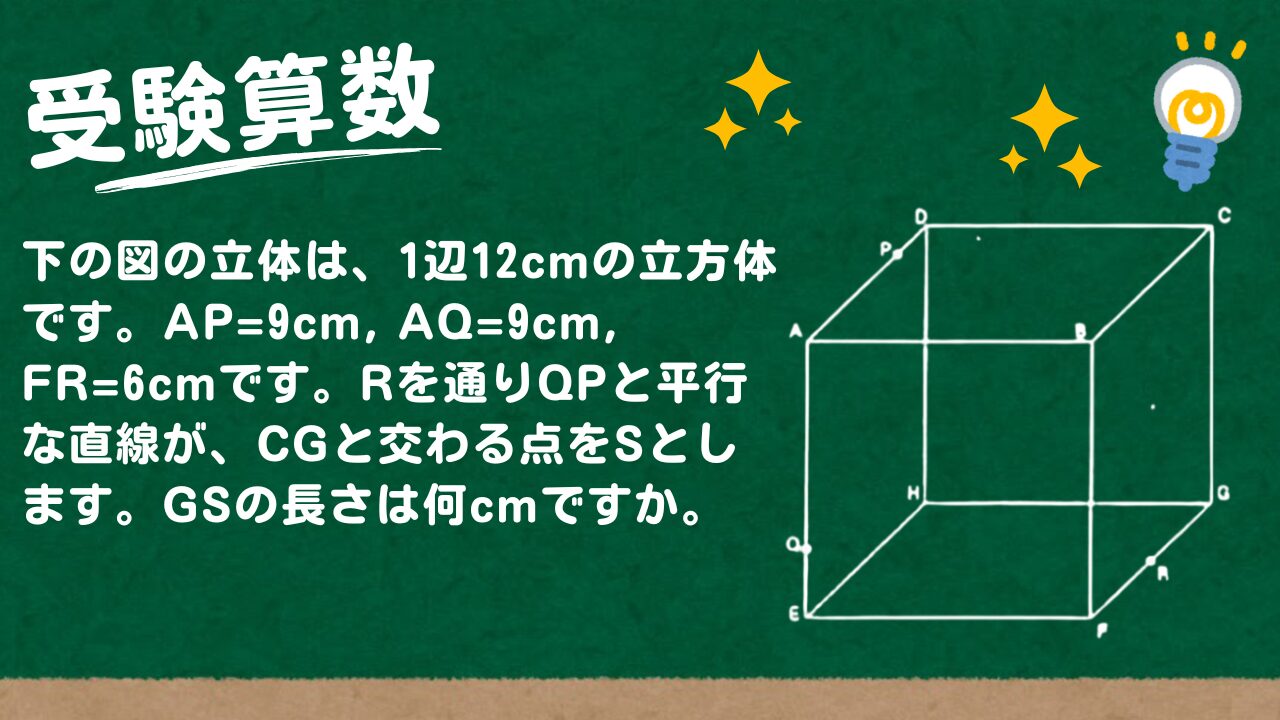
単元:
#算数(中学受験)#立体図形#立体切断
教材:
#SPX#6年算数W-支援#中学受験教材
指導講師:
理数個別チャンネル
問題文全文(内容文):
下の図の立体は、1辺12cmの立方体です。AP=9cm, AQ=9cm, FR=6cmです。
(1) Rを通りQPと平行な直線が、CGと交わる点をSとします。GSの長さは何cmですか。
(2) PQをQの方向へ延長した直線が、HEをEの方向へ延長した直線と交わる点をTとします。ETの長さは何cmですか。
(3) TRがEFと交わる点をUとします。EUの長さは何cmですか。
(4) Pを通りTUと平行な直線が、CDと交わる点をVとします。DVの長さは何cmですか。
この動画を見る
下の図の立体は、1辺12cmの立方体です。AP=9cm, AQ=9cm, FR=6cmです。
(1) Rを通りQPと平行な直線が、CGと交わる点をSとします。GSの長さは何cmですか。
(2) PQをQの方向へ延長した直線が、HEをEの方向へ延長した直線と交わる点をTとします。ETの長さは何cmですか。
(3) TRがEFと交わる点をUとします。EUの長さは何cmですか。
(4) Pを通りTUと平行な直線が、CDと交わる点をVとします。DVの長さは何cmですか。
【受験算数】立体切断演習問題その13「断面部の体積を求める問題3」
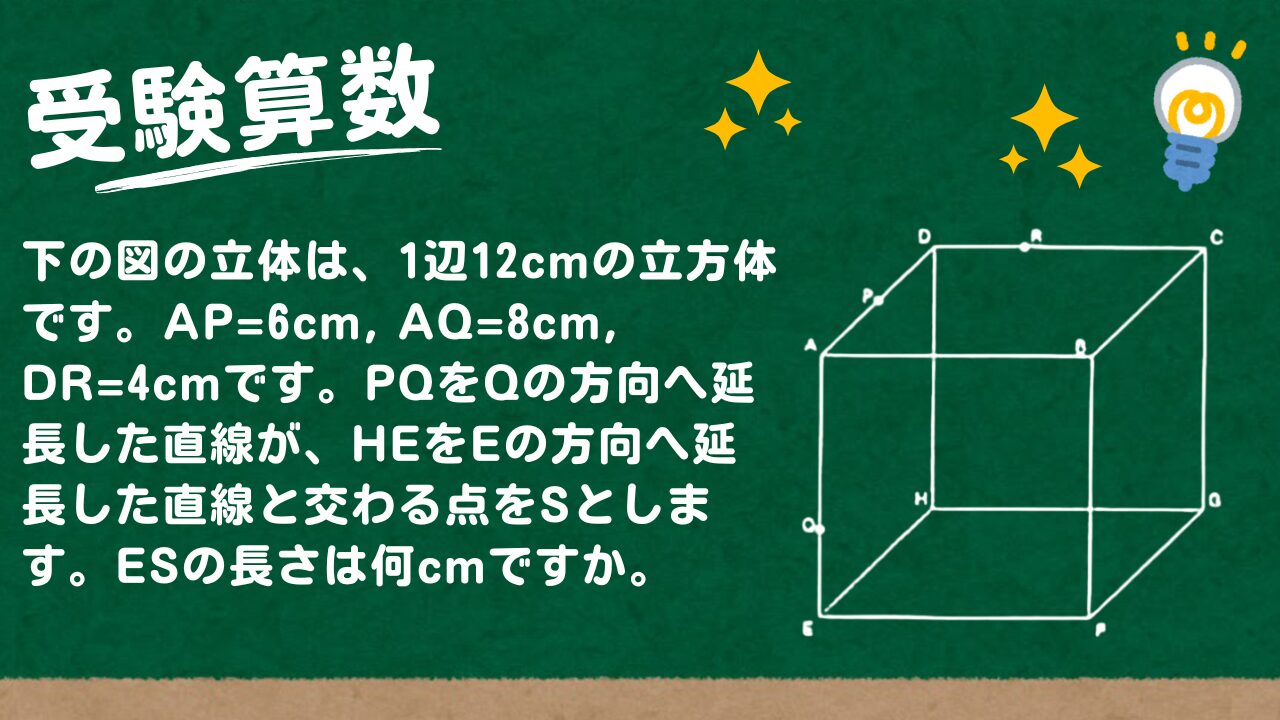
単元:
#算数(中学受験)#立体図形#立体切断
教材:
#SPX#6年算数W-支援#中学受験教材
指導講師:
理数個別チャンネル
問題文全文(内容文):
下の図の立体は、1辺12cmの立方体です。AP=6cm, AQ=8cm, DR=4cmです。
(I) PQをQの方向へ延長した直線が、HEをEの方向へ延長した直線と交わる点をSとします。ESの長さは何cmですか。
(2) QPをPの方向へ延長した直線が、HDをDの方向へ延長した直線と交わる点をTとします。DTの長さは何cmですか。
(3) TRをRの方向へ延長した直線が、GHと交わる点をUとします。HUの長さは何cmですか。
(4) この立方体を3つの点P, Q, Rを過る平面で切断してできる立体のうち、 点Hをふくむ立体の体積は何㎤ですか。
この動画を見る
下の図の立体は、1辺12cmの立方体です。AP=6cm, AQ=8cm, DR=4cmです。
(I) PQをQの方向へ延長した直線が、HEをEの方向へ延長した直線と交わる点をSとします。ESの長さは何cmですか。
(2) QPをPの方向へ延長した直線が、HDをDの方向へ延長した直線と交わる点をTとします。DTの長さは何cmですか。
(3) TRをRの方向へ延長した直線が、GHと交わる点をUとします。HUの長さは何cmですか。
(4) この立方体を3つの点P, Q, Rを過る平面で切断してできる立体のうち、 点Hをふくむ立体の体積は何㎤ですか。
【受験算数】立体切断演習問題その12「断面部の体積を求める問題2」
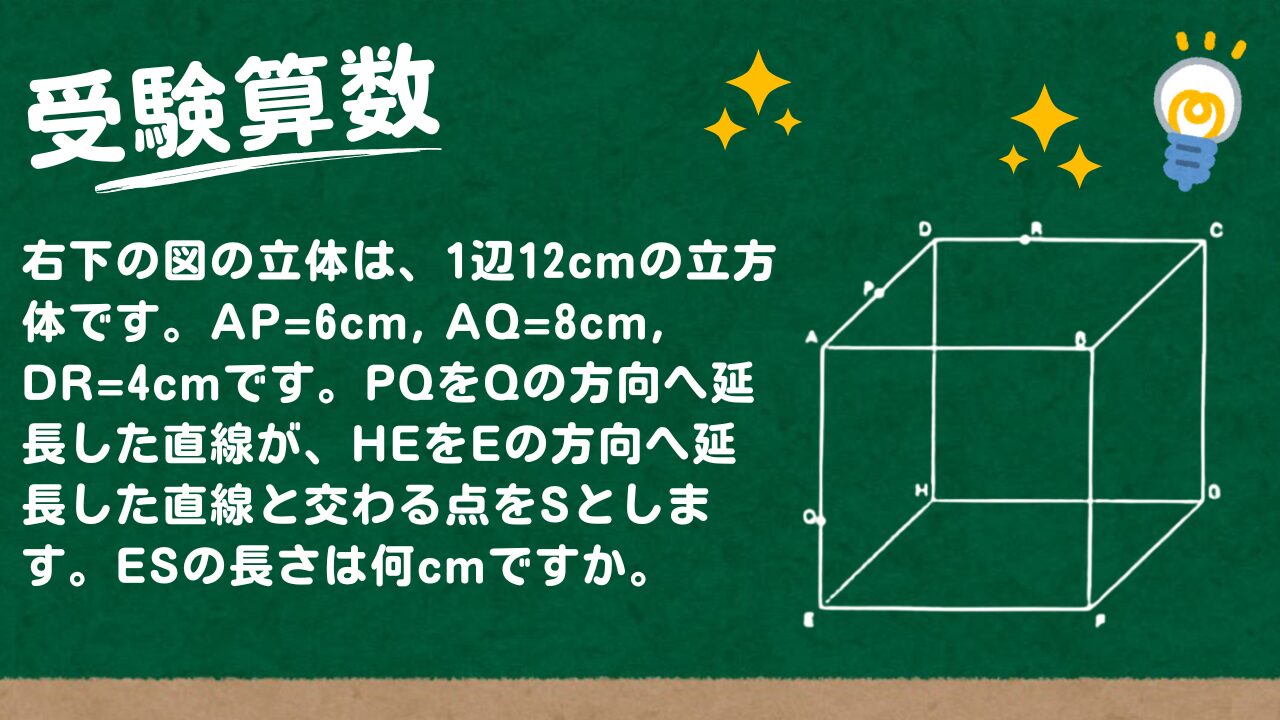
単元:
#算数(中学受験)#立体図形#立体切断
教材:
#SPX#6年算数W-支援#中学受験教材
指導講師:
理数個別チャンネル
問題文全文(内容文):
右下の図の立体は、1辺12cmの立方体です。AP=6cm, AQ=8cm, DR=4cmです。
PQをQの方向へ延長した直線が、HEをEの方向へ延長した直線と交わる点をSとします。ESの長さは何cmですか。
この動画を見る
右下の図の立体は、1辺12cmの立方体です。AP=6cm, AQ=8cm, DR=4cmです。
PQをQの方向へ延長した直線が、HEをEの方向へ延長した直線と交わる点をSとします。ESの長さは何cmですか。
【受験算数】立体切断演習問題その11「断面部の体積を求める問題1」
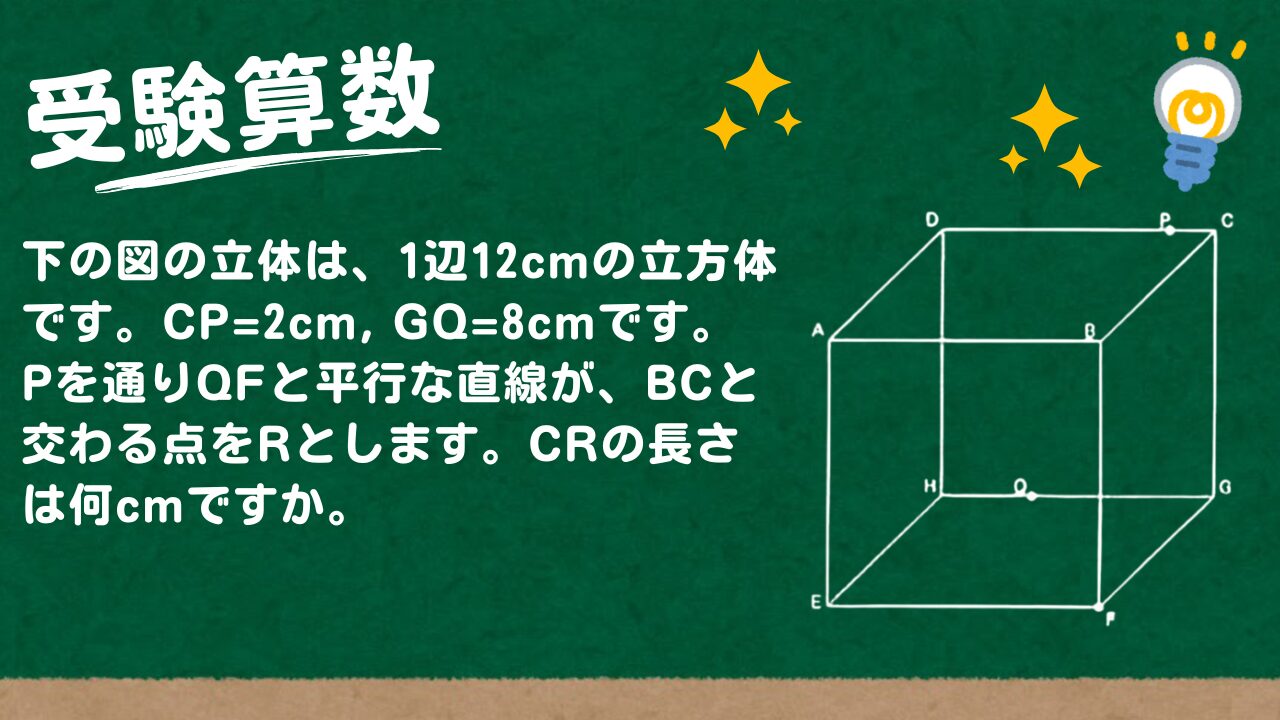
単元:
#算数(中学受験)#立体図形#立体切断
教材:
#SPX#6年算数W-支援#中学受験教材
指導講師:
理数個別チャンネル
問題文全文(内容文):
下の図の立体は、1辺12cmの立方体です。CP=2cm, GQ=8cmです。
Pを通りQFと平行な直線が、BCと交わる点をRとします。CRの長さは何cmですか。
この動画を見る
下の図の立体は、1辺12cmの立方体です。CP=2cm, GQ=8cmです。
Pを通りQFと平行な直線が、BCと交わる点をRとします。CRの長さは何cmですか。
【数Ⅲ】2次曲線:極方程式をゼロからはじめましょう

【数Ⅲ】極方程式をゼロからはじめましょう

【数Ⅲ】2次曲線:極座標をゼロから始めましょう

【数Ⅲ】極座標をゼロから始めましょう

【共通選抜・英語】令和4年神奈川県公立高校入試総括

神奈川県高校入試英語における2022年度新単元の問題解説
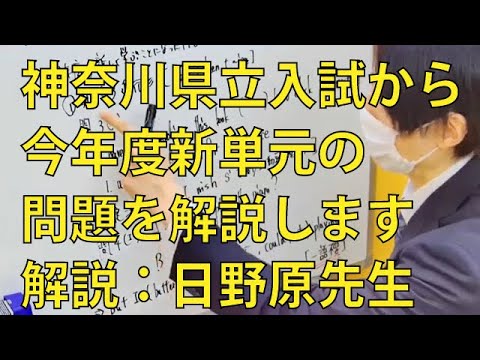
単元:
#英語(高校生)#大学入試過去問(英語)#学校別大学入試過去問解説(英語)
指導講師:
理数個別チャンネル
問題文全文(内容文):
神奈川県高校入試英語における2022年度新単元の問題解説してみた.
この動画を見る
神奈川県高校入試英語における2022年度新単元の問題解説してみた.
【2022年神奈川県立入試】神奈川県立入試から今年度新単元の問題解説【共通選抜・英語】

単元:
#英語(中学生)#英語(高校生)#英文法#中3英語#時制#現在完了(継続、経験、完了・結果)#高校入試過去問(英語)#神奈川県立高校入試
指導講師:
理数個別チャンネル
問題文全文(内容文):
令和4年の神奈川県公立入試の中から、今年度より加わった単元である、現在完了進行形と仮定法過去からの出題にクロースアップします。
この動画を見る
令和4年の神奈川県公立入試の中から、今年度より加わった単元である、現在完了進行形と仮定法過去からの出題にクロースアップします。
【受験算数】筑駒の2022年入試の難問をガチ解説してみた
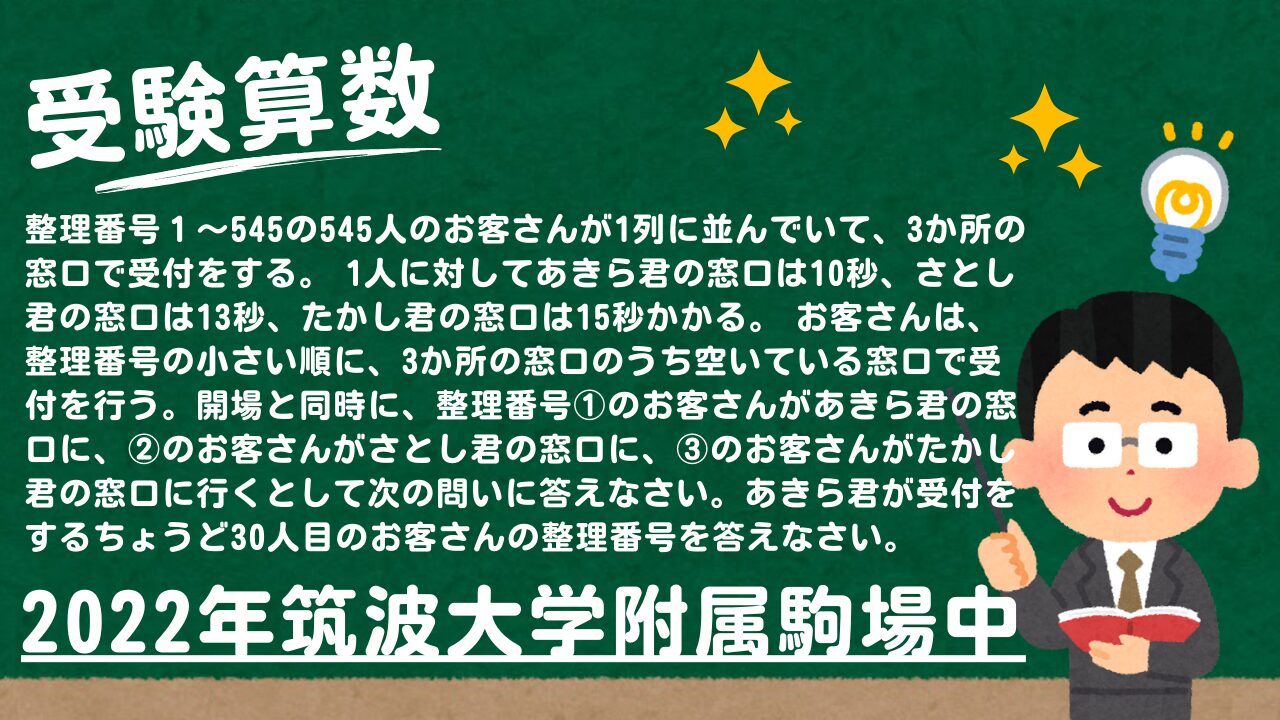
単元:
#過去問解説(学校別)#筑波大学附属駒場中学
指導講師:
理数個別チャンネル
問題文全文(内容文):
[4]整理番号1~545の545人のお客さんが1列に並んでいて、3か所の窓口で受付をする。
1人に対してあきら君の窓口は10秒、さとし君の窓口は13秒、たかし君の窓口は15秒かかる。
お客さんは、整理番号の小さい順に、3か所の窓口のうち空いている窓口で受付を行う。
どの窓口も、受付しているお客さんが終わったら、すぐに次のお客さんの受付が始まる。
1か所の窓口に同時に2人以上のお客さんが行くことはない。
開場と同時に、整理番号①のお客さんがあきら君の窓口に、②のお客さんがさとし君の窓口に、③のお客さんがたかし君の窓口に行くとして次の問いに答えなさい。
(1)あきら君が受付をするちょうど30人目のお客さんの整理番号を答えなさい。
(2)(ア)整理番号165のお客さんの受付が終わるのは開場から何秒後ですか?
(イ)整理番号165のお客さんの受付をするのは、あきら君・さとし君・たかし君の誰ですか?
開場からしばらくして、窓口のあきら君・さとし君・たかし君のうちの一人が、あるお客さんの受付を終えると同時にゆたか君と交代しました。ゆたか君がお客さん1人に対してかかる時間は8秒です。この結果、開場からちょうど2022秒後に、整理番号545のお客さんの受付が終わりました。
(3)ゆたか君は、開場から何秒後にあきら君・さとし君・ゆたか君のうちの誰と交代しましたか?
この動画を見る
[4]整理番号1~545の545人のお客さんが1列に並んでいて、3か所の窓口で受付をする。
1人に対してあきら君の窓口は10秒、さとし君の窓口は13秒、たかし君の窓口は15秒かかる。
お客さんは、整理番号の小さい順に、3か所の窓口のうち空いている窓口で受付を行う。
どの窓口も、受付しているお客さんが終わったら、すぐに次のお客さんの受付が始まる。
1か所の窓口に同時に2人以上のお客さんが行くことはない。
開場と同時に、整理番号①のお客さんがあきら君の窓口に、②のお客さんがさとし君の窓口に、③のお客さんがたかし君の窓口に行くとして次の問いに答えなさい。
(1)あきら君が受付をするちょうど30人目のお客さんの整理番号を答えなさい。
(2)(ア)整理番号165のお客さんの受付が終わるのは開場から何秒後ですか?
(イ)整理番号165のお客さんの受付をするのは、あきら君・さとし君・たかし君の誰ですか?
開場からしばらくして、窓口のあきら君・さとし君・たかし君のうちの一人が、あるお客さんの受付を終えると同時にゆたか君と交代しました。ゆたか君がお客さん1人に対してかかる時間は8秒です。この結果、開場からちょうど2022秒後に、整理番号545のお客さんの受付が終わりました。
(3)ゆたか君は、開場から何秒後にあきら君・さとし君・ゆたか君のうちの誰と交代しましたか?
【受験算数】立体切断演習問題その10「切断面が複雑になる問題4」
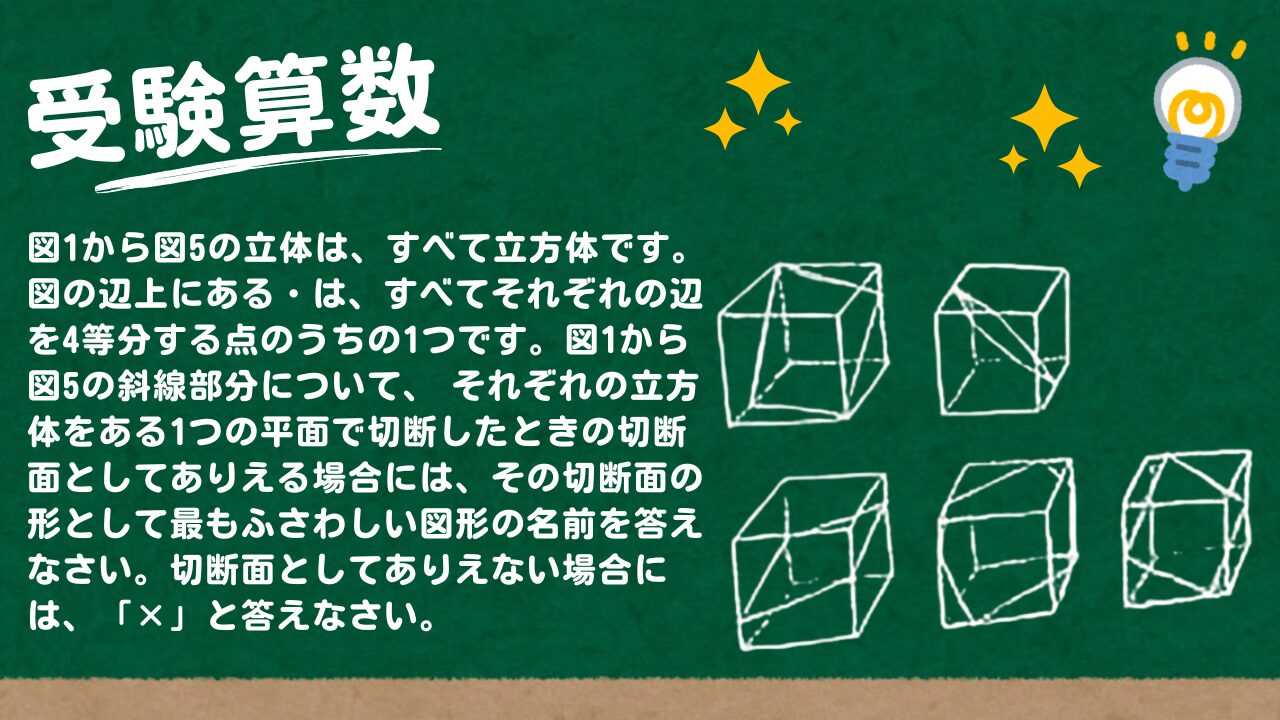
単元:
#算数(中学受験)#立体図形#立体切断
教材:
#SPX#6年算数W-支援#中学受験教材
指導講師:
理数個別チャンネル
問題文全文(内容文):
下の図1から図5の立体は、すべて立方体です。図の辺上にある・は、すべてそれぞれの辺を4等分する点のうちの1つです。図1から図5の斜線部分について、 それぞれの立方体をある1つの平面で切断したときの切断面としてありえる場合には、その切断面の形として最もふさわしい図形の名前を答えなさい。切断面としてありえない場合には、「×」と答えなさい。
この動画を見る
下の図1から図5の立体は、すべて立方体です。図の辺上にある・は、すべてそれぞれの辺を4等分する点のうちの1つです。図1から図5の斜線部分について、 それぞれの立方体をある1つの平面で切断したときの切断面としてありえる場合には、その切断面の形として最もふさわしい図形の名前を答えなさい。切断面としてありえない場合には、「×」と答えなさい。
【受験算数】立体切断演習問題その9「切断面が複雑になる問題3」
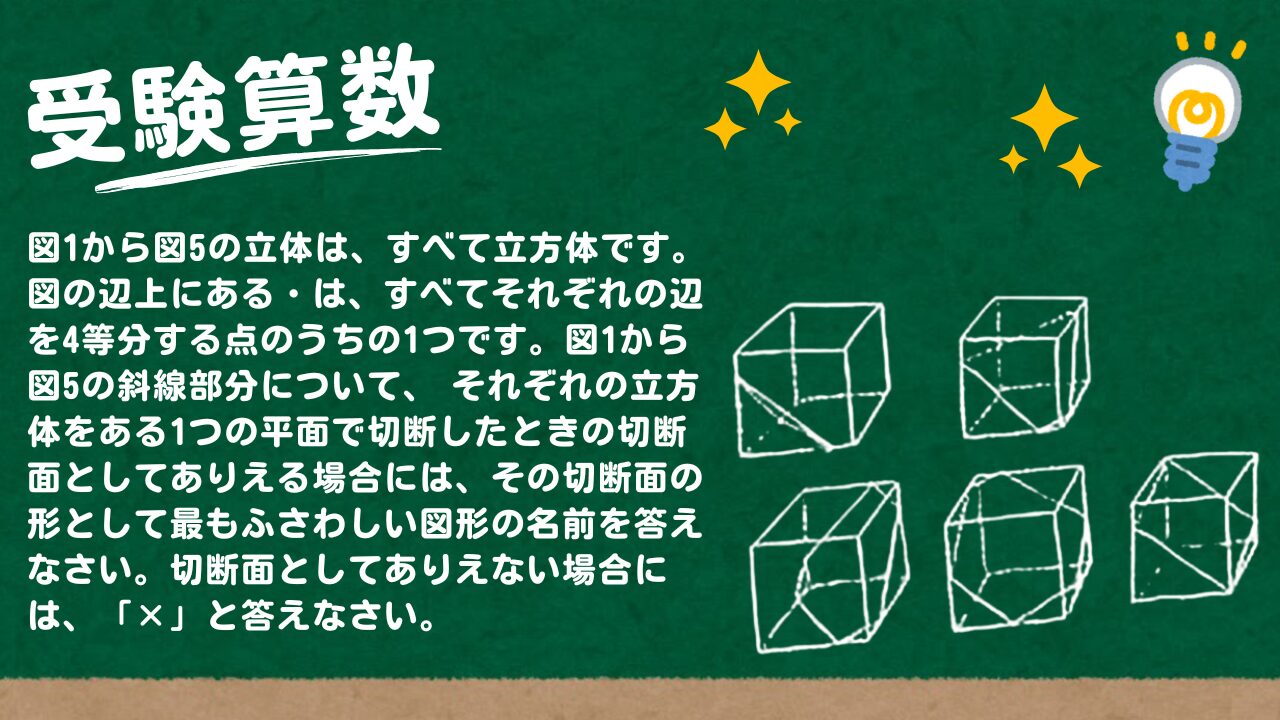
単元:
#算数(中学受験)#立体図形#立体切断
教材:
#SPX#6年算数W-支援#中学受験教材
指導講師:
理数個別チャンネル
問題文全文(内容文):
下の図1から図5の立体は、すべて立方体です。図の辺上にある・は、すべてそれぞれの辺を4等分する点のうちの1つです。図1から図5の斜線部分について、 それぞれの立方体をある1つの平面で切断したときの切断面としてありえる場合には、その切断面の形として最もふさわしい図形の名前を答えなさい。切断面としてありえない場合には、「×」と答えなさい。
この動画を見る
下の図1から図5の立体は、すべて立方体です。図の辺上にある・は、すべてそれぞれの辺を4等分する点のうちの1つです。図1から図5の斜線部分について、 それぞれの立方体をある1つの平面で切断したときの切断面としてありえる場合には、その切断面の形として最もふさわしい図形の名前を答えなさい。切断面としてありえない場合には、「×」と答えなさい。
【受験算数】立体切断演習問題その8「切断面が複雑になる問題2」
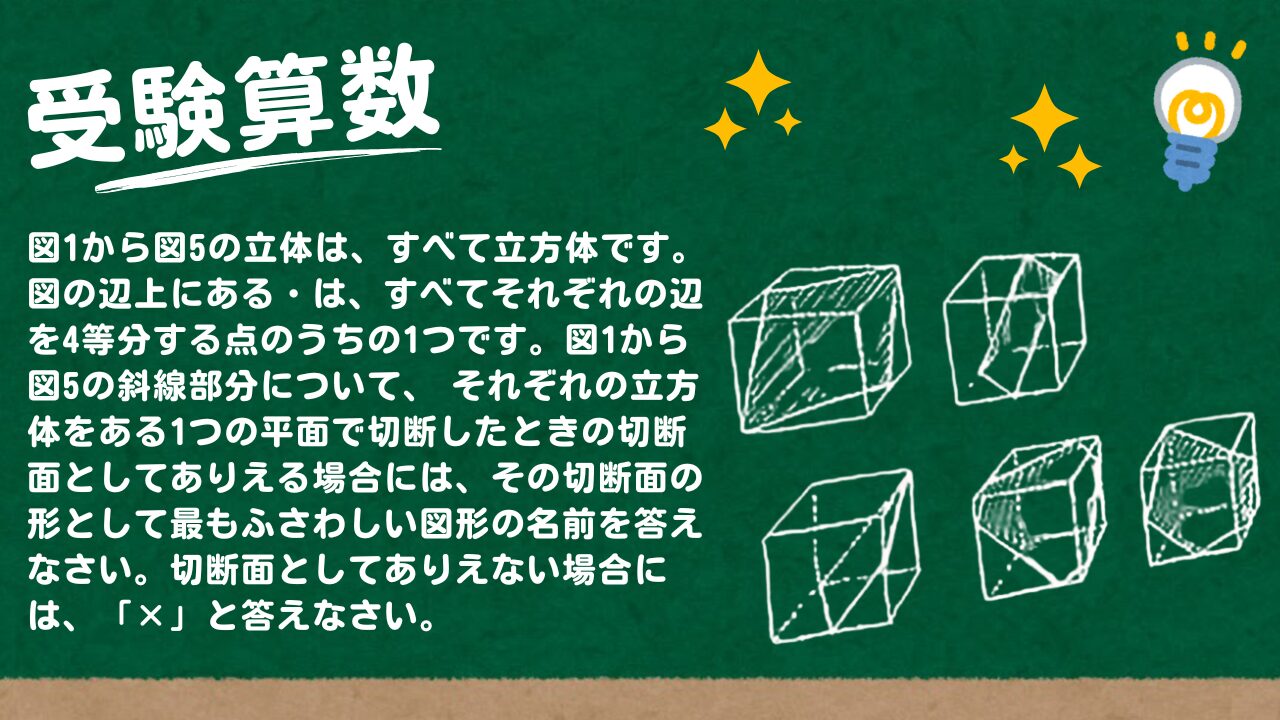
単元:
#算数(中学受験)#立体図形#立体切断
教材:
#SPX#6年算数W-支援#中学受験教材
指導講師:
理数個別チャンネル
問題文全文(内容文):
下の図1から図5の立体は、すべて立方体です。図の辺上にある・は、すべてそれぞれの辺を4等分する点のうちの1つです。図1から図5の斜線部分について、 それぞれの立方体をある1つの平面で切断したときの切断面としてありえる場合には、その切断面の形として最もふさわしい図形の名前を答えなさい。切断面としてありえない場合には、「×」と答えなさい。
この動画を見る
下の図1から図5の立体は、すべて立方体です。図の辺上にある・は、すべてそれぞれの辺を4等分する点のうちの1つです。図1から図5の斜線部分について、 それぞれの立方体をある1つの平面で切断したときの切断面としてありえる場合には、その切断面の形として最もふさわしい図形の名前を答えなさい。切断面としてありえない場合には、「×」と答えなさい。
【受験算数】立体切断演習問題その7「切断面が複雑になる問題1」
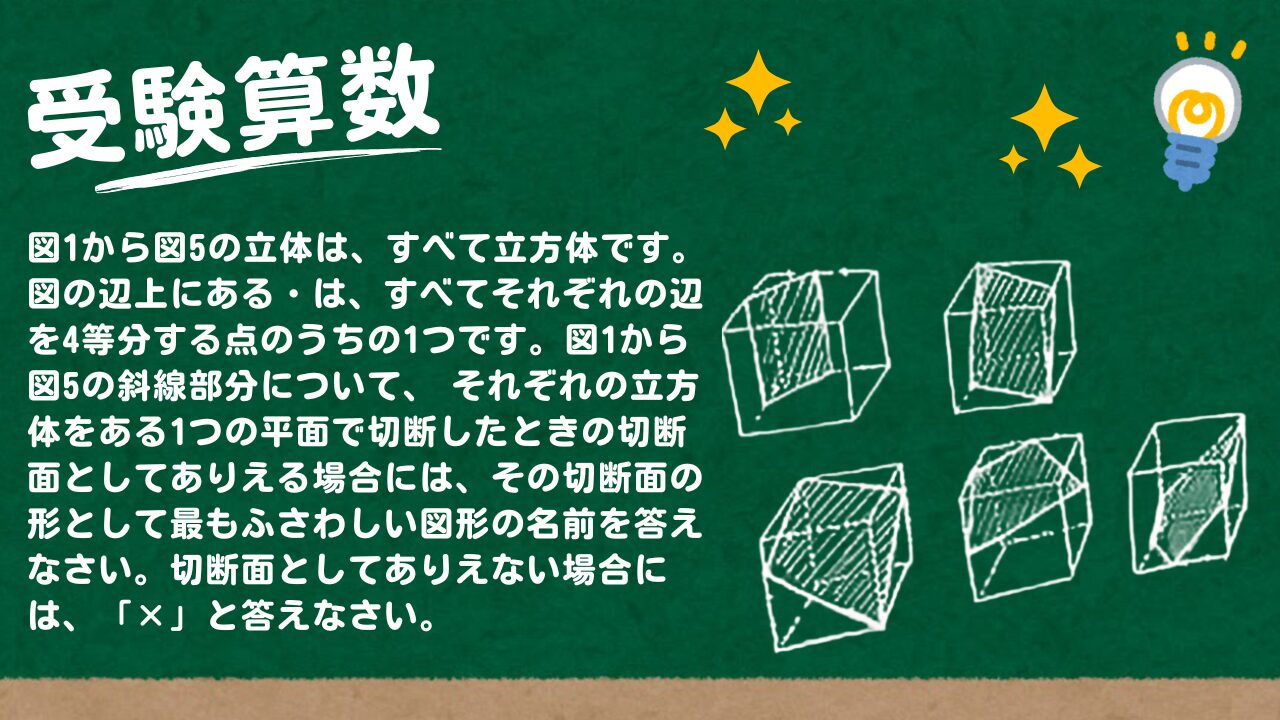
単元:
#算数(中学受験)#立体図形#立体切断
教材:
#SPX#6年算数W-支援#中学受験教材
指導講師:
理数個別チャンネル
問題文全文(内容文):
下の図1から図5の立体は、すべて立方体です。図の辺上にある・は、すべてそれぞれの辺を4等分する点のうちの1つです。図1から図5の斜線部分について、 それぞれの立方体をある1つの平面で切断したときの切断面としてありえる場合には、その切断面の形として最もふさわしい図形の名前を答えなさい。切断面としてありえない場合には、「×」と答えなさい。
この動画を見る
下の図1から図5の立体は、すべて立方体です。図の辺上にある・は、すべてそれぞれの辺を4等分する点のうちの1つです。図1から図5の斜線部分について、 それぞれの立方体をある1つの平面で切断したときの切断面としてありえる場合には、その切断面の形として最もふさわしい図形の名前を答えなさい。切断面としてありえない場合には、「×」と答えなさい。
【受験算数】立体切断演習問題その6「切断面を伸ばして考える4」
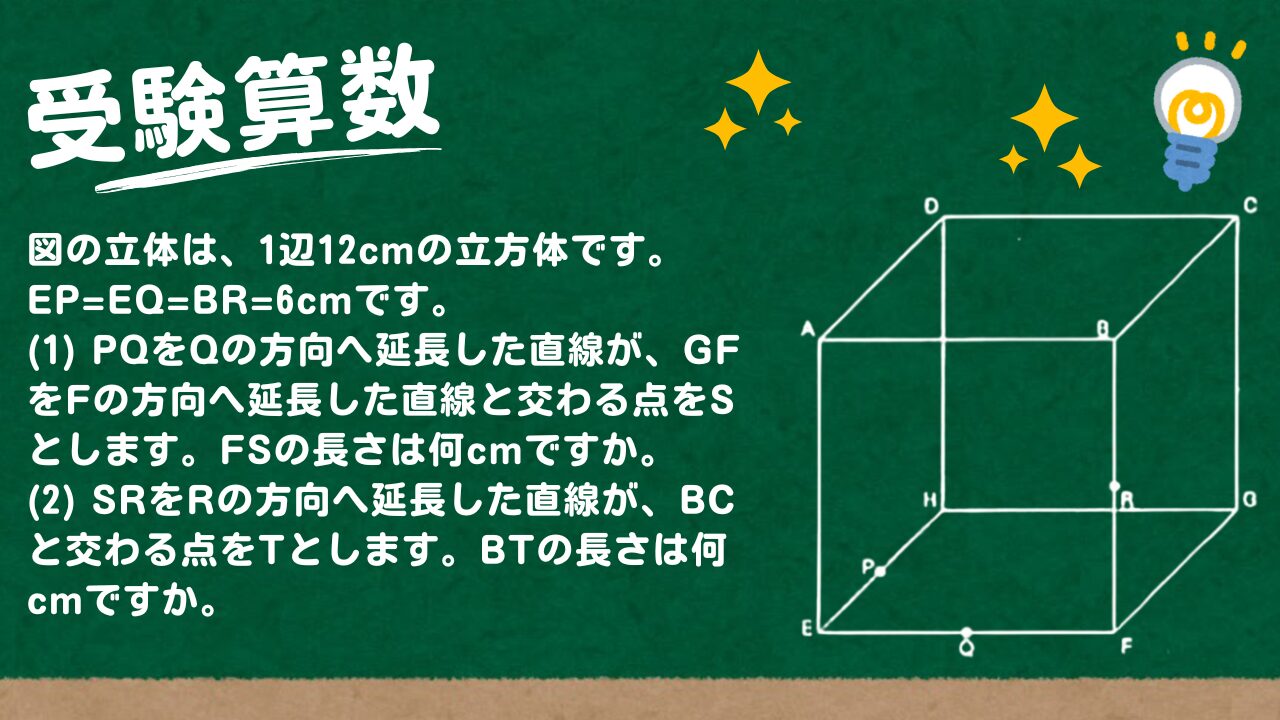
単元:
#算数(中学受験)#立体図形#立体切断
教材:
#SPX#6年算数W-支援#中学受験教材
指導講師:
理数個別チャンネル
問題文全文(内容文):
下の図の立体は、1辺12cmの立方体です。EP=EQ=BR=6cmです。
(1) PQをQの方向へ延長した直線が、GFをFの方向へ延長した直線と交わる点をSとします。FSの長さは何cmですか。
(2) SRをRの方向へ延長した直線が、BCと交わる点をTとします。BTの長さは何cmですか。
この動画を見る
下の図の立体は、1辺12cmの立方体です。EP=EQ=BR=6cmです。
(1) PQをQの方向へ延長した直線が、GFをFの方向へ延長した直線と交わる点をSとします。FSの長さは何cmですか。
(2) SRをRの方向へ延長した直線が、BCと交わる点をTとします。BTの長さは何cmですか。
【受験算数】立体切断演習問題その5「切断面を伸ばして考える3」
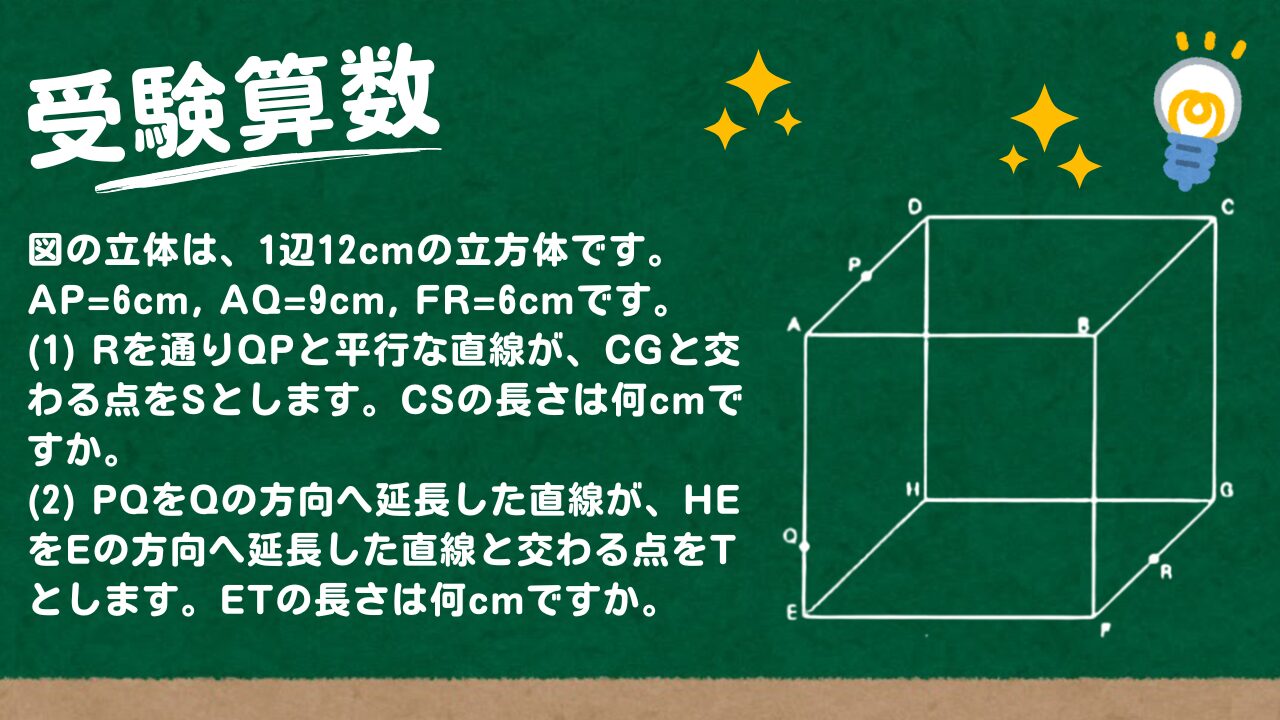
単元:
#算数(中学受験)#立体図形#立体切断
教材:
#SPX#6年算数W-支援#中学受験教材
指導講師:
理数個別チャンネル
問題文全文(内容文):
下の図の立体は、1辺12cmの立方体です。AP=6cm, AQ=9cm, FR=6cmです。
(1) Rを通りQPと平行な直線が、CGと交わる点をSとします。CSの長さは何cmですか。
(2) PQをQの方向へ延長した直線が、HEをEの方向へ延長した直線と交わる点をTとします。ETの長さは何cmですか。
この動画を見る
下の図の立体は、1辺12cmの立方体です。AP=6cm, AQ=9cm, FR=6cmです。
(1) Rを通りQPと平行な直線が、CGと交わる点をSとします。CSの長さは何cmですか。
(2) PQをQの方向へ延長した直線が、HEをEの方向へ延長した直線と交わる点をTとします。ETの長さは何cmですか。
【理数個別の過去問解説】2019年度 明治大学 経営学部 数学 第3問解説(1)

単元:
#大学入試過去問(数学)#学校別大学入試過去問解説(数学)#明治大学#数学(高校生)
指導講師:
理数個別チャンネル
問題文全文(内容文):
〔Ⅲ〕$x+2y=5、x\gt 0,y\gt 0$を満たす実数x,yがある。
(1) $2x^2+y^2$の最小値
(2) $\log_{10}x+2\log_{10}y$ の最大値
(3) $\dfrac{1}{x}+\dfrac{2}{y}$ の最小値
この動画を見る
〔Ⅲ〕$x+2y=5、x\gt 0,y\gt 0$を満たす実数x,yがある。
(1) $2x^2+y^2$の最小値
(2) $\log_{10}x+2\log_{10}y$ の最大値
(3) $\dfrac{1}{x}+\dfrac{2}{y}$ の最小値
【英語】比較:ヒトラー構文

単元:
#英語(高校生)#英文法#会話文・イディオム・構文・英単語#構文#比較
指導講師:
理数個別チャンネル
問題文全文(内容文):
定義を述べるクジラ構文ではなく、程度を述べるヒトラー構文
この動画を見る
定義を述べるクジラ構文ではなく、程度を述べるヒトラー構文
【理科】化学式の規則について教えます!なぜMgCl₂は2がつくの?

【英語】not A or B イケメンか金持ちの否定
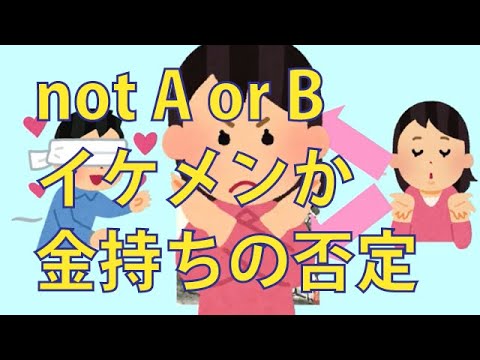
単元:
#英語(高校生)#英文法#中2英語#否定表現・特別な表現#接続詞(and,or,but,so・when,if,because,before,after・接続詞that)
指導講師:
理数個別チャンネル
問題文全文(内容文):
not A or Bの意味について考えてみましょう。
この動画を見る
not A or Bの意味について考えてみましょう。
【受験算数】立体切断演習問題その4「切断面を伸ばして考える2」
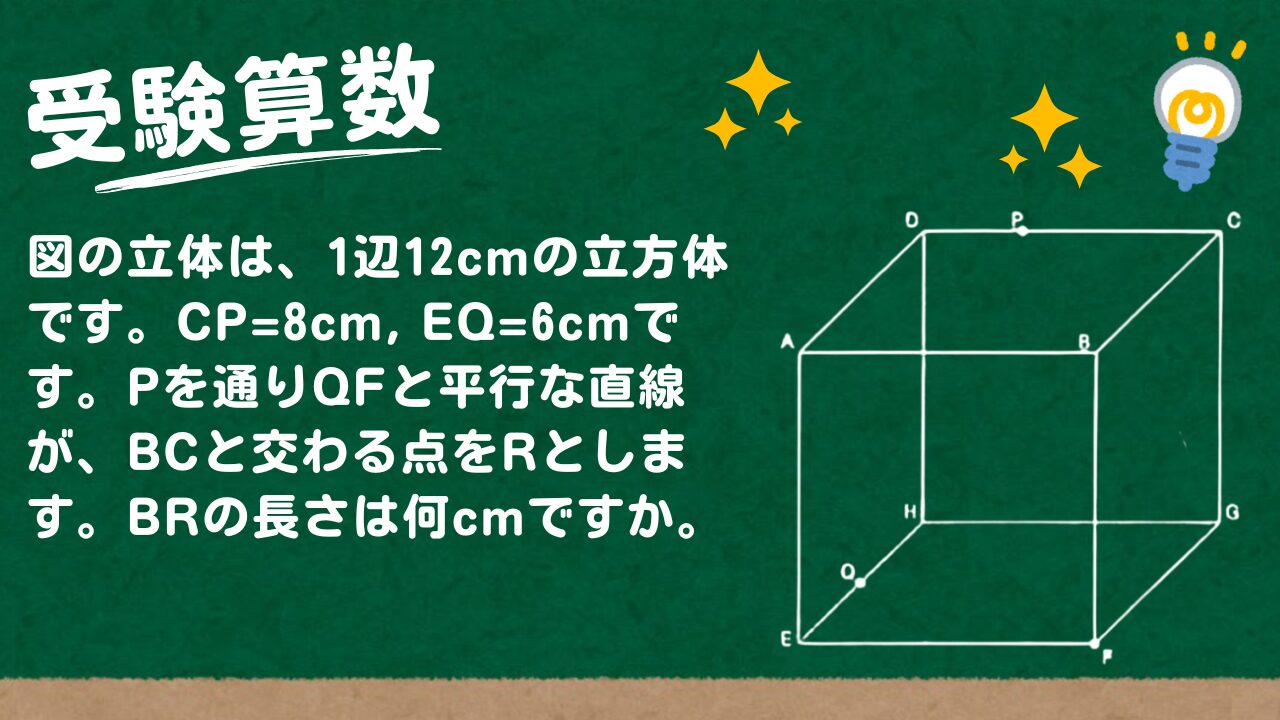
単元:
#算数(中学受験)#立体図形#立体切断
教材:
#SPX#6年算数W-支援#中学受験教材
指導講師:
理数個別チャンネル
問題文全文(内容文):
下の図の立体は、1辺12cmの立方体です。CP=8cm, EQ=6cmです。
(1) Pを通りQFと平行な直線が、BCと交わる点をRとします。BRの長さは何cmですか。
この動画を見る
下の図の立体は、1辺12cmの立方体です。CP=8cm, EQ=6cmです。
(1) Pを通りQFと平行な直線が、BCと交わる点をRとします。BRの長さは何cmですか。




